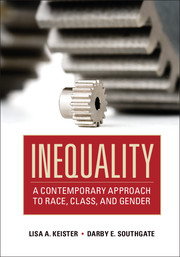4 - Class and the Structure of Inequality
from I - Basic Concepts
Summary
The notion of social class is fundamental to understanding the structure of inequality and stratification. Debates are ongoing about how to define and measure social class, which social classes exist in the United States, and how much class consciousness Americans have. There also are debates about whether social class or other personal traits – such as race, ethnicity, and gender – matter more for determining well-being. Despite these debates, however, there is widespread agreement that social class is extremely important. This chapter explores the most consequential dimensions of social class and addresses why social class might matter. The chapter begins by defining social class and exploring various meanings of class. Economic and cultural (or lifestyle) dimensions of class and how they differ are discussed next. Methods for identifying social classes and differences in estimates of the size of social classes that emerge are described. The process by which class and class characteristics are transmitted across generations is explored, and the chapter concludes with a discussion of the meaning and importance of class consciousness.
What Is a Social Class?
Most people have a sense of what social class is, and many of us occasionally mention class in everyday conversations. We understand that class is the basis on which societies are divided. We think about upper, middle, lower, and perhaps professional classes, and we have a sense of who falls into which group. We also have a sense of where we fit in the class structure. When researchers ask Americans which class they belong to, nearly everyone has an answer. Despite this general agreement about the basic concept of class, however, there is little consensus about the details regarding how classes are divided. That is, there is not complete agreement about questions such as whether groups like professionals comprise a unique class and whether we need fine gradations such as upper-upper class and lower-middle class (rather than simply upper class and middle class). There also is little agreement about whether people have an accurate sense of what class they belong to, whether class membership means anything to most people, and whether social class is an important determinant of other outcomes. For example, there is significant disagreement about whether the social class to which we are born determines outcomes such as adult income and education or other factors such as race/ethnicity and gender matter more. Sociologists and other social scientists disagree about the specifics of the definition of social class, how to measure class, and where to draw class boundaries.
Information
- Type
- Chapter
- Information
- InequalityA Contemporary Approach to Race, Class, and Gender, pp. 131 - 168Publisher: Cambridge University PressPrint publication year: 2012
